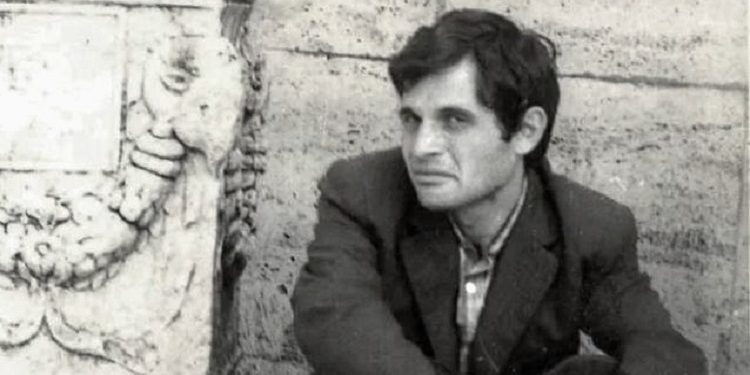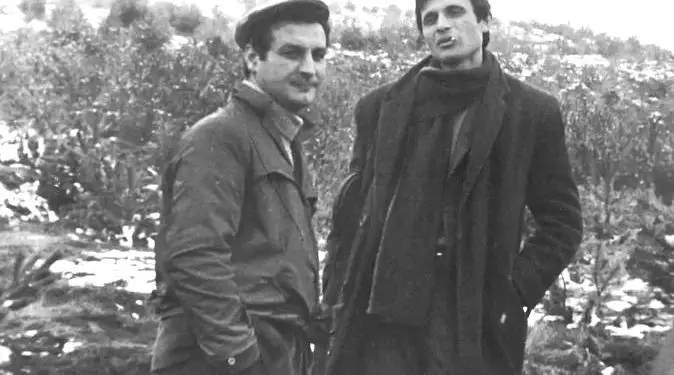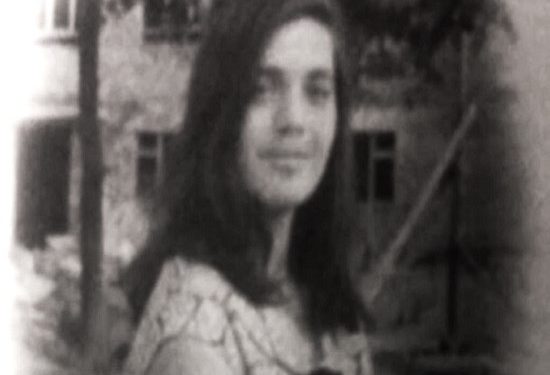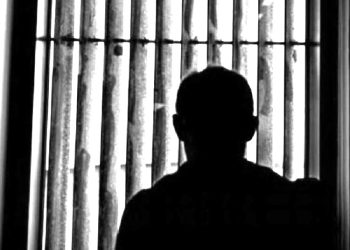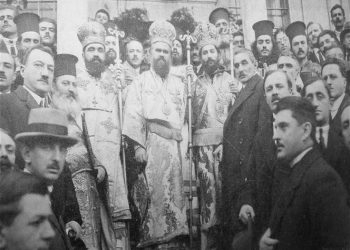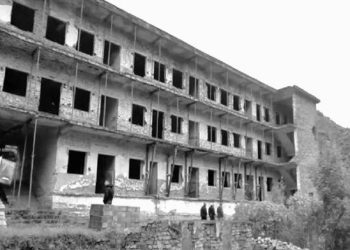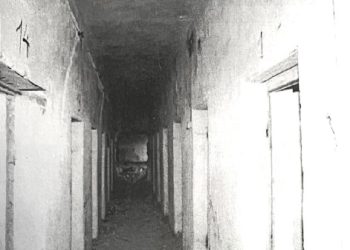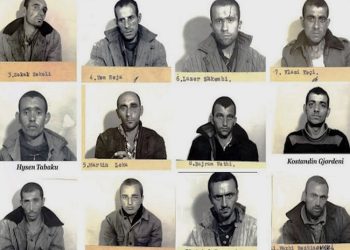By Adelina Gina
The fifth part
-“I cried for you like dead, I waited for you like alive”-
Memorie.al / Rescue Gina, graduated in Journalism at the University of Tirana, in 1974, playwright, screenwriter and librettist, in the early 70s, thanks to his extraordinary talent, his work, works and creativity , “shocked” the artistic institutions of Tirana, such as; The People’s Theatre, the Opera and Ballet Theatre, the High Institute of Arts and the Albanian Radio-Television. He was one of the most sought-after chiefs and senior leaders of these institutions. In the time period 1971-1974, he left his mark, having collaborated closely with some of the most famous names of that time, such as: Mihallaq Luarasi, Kujtim Spahivogli, Pirro Mani, Mario Ashiku, Zhani Ciko, Nikolla Zoraqi and director Mevlan Shanaj and operator Pali Kuke. But the traces he left in these cultural and artistic institutions were unfortunately lost in the official silence of the communist regime?! In August 1974, Shpëtim Gina, lost his life in unexplained circumstances, drowning in two feet of water, in the river Drojë of Mamurras, (where he was performing the military choir together with other students), two days before, he had put a lightning sheet to the Chief of the General Staff of the Army! Was it really an accidental death, or was Shpëtim Gina eliminated by the State Security?! Why his “friend” who was with him until the last moments, declares that; “The body that was taken in the ambulance, wasn’t it Rescue?! Or the doctor of the military department of students, Mark N., who says: “We immediately went to the scene, but we did not find the body of Spetimi”?! And his family, why insists that; “They didn’t allow us to open the coffin before the burial when they brought it home and years later, we opened the grave in ‘Stalin City’, to bring it to Tirana, where we had moved as a family, those bones were not of Salvation, as they were missing. ..”?! Many questions, which have not yet received an answer! His sister, Adelina Gina graduated in journalism in the late 60s, in a book of hers titled; ‘Where did you take Salvation’, published in the USA.
Continues from last issue
We headed towards the cemetery. Petrit and I got into a white car. I was leaning on his shoulder, he was sixteen. Peçi sat in front with the driver. The coffin was placed in a large covered military car, with student soldiers. He was being buried with military ceremony. At the intersection, where one road leads to the cemetery, the car where I was with Petrit caught fire. They took us out quickly. They came from the houses by the road and threw blankets at us. A woman called out: “Cuckoo, what has happened? Go back”! After a few moments we continued on the road to the cemetery. Here is the open grave, people, Dawn, giving a speech, flowers, my eyes darkened and I snapped.
I remember when I was mentioned, I was at home. When my mother died, I was also asked about anything. Now there was no fire, no bombs fell on everyone, I didn’t want to know?! According to custom, when they return from the funeral, they lay down to eat. Later in the city, it was said that at that lunch, no one put the spoon in their mouth. As it was laid so it all poured out. Night came, the windows and doors were all open, and the lights were all on. Everything pointed to a great destruction.
I started to sober up. Ana was standing next to me. He had come by himself, straight from Tirana. “The workers didn’t take me,” she said. It was about those from Television who came to the funeral. I entered his room, there was no one, I took a suitcase, there was all his work, I opened it. How neat it was: folders with different writings, neatly organized, notes in a separate pad, even pens, rulers, erasers, and pencil cases, all neatly placed. I didn’t take it out the main door, but through the window, the house was one story. I hid it in the neighbor’s house; she had opened the house for us. “What are you doing like this”?! – Ana told me.
“Salvation did not die accidentally. This is the hand of the State Security. The Security killed him,” I said. That was the first thought that came to my mind that night. “It’s not accidental; I said to myself, he couldn’t die like that. The writings must be preserved. No one must know that they are here.” I don’t even know why I thought that. Maybe some connections were made in my brain, some events happened. One night we were both returning. At the Clock, Salvation broke away from me and stopped a young man; I was very close to them. “We save her,” he said. “How much do they pay you for me? You are a good boy, why do you work as a spy, go find another job. And if you clean the toilets, you are more honorable”, said Shpëtimi.
The other did not answer. Salvation came back to me: “I can’t leave, he even checked my room.” I pulled her by the arm. He, whom Shpëtimi accused, was a student, he looked like a wise guy, and he walked with a slight limp. “Why did you do it like that?” I told him later. “There are too many, he told me, you have nothing to do with them. You know how they watch me, even their deputy minister; he doesn’t take his eyes off me. I can’t tell everyone. But I have only one feature, which distinguishes those from over there.” And so when we walked, he often said to me: “Look at that tall man with glasses, he’s from Sigurimi.” Or: “And that doctor with the briefcase, that job does”.
“They killed him, they killed him. But how, how?! What trap did they set for them?! Why did they kill him”?! I kept these things in my mind until it dawned on me. People came in, came out, I was indifferent. Mani came, he had taken wear the next day. He was crying with his eyes on the floor. Whatever he wanted to say to me, there was no consolation for me. “They killed him,” I said. He nodded. He got up and went out, burst into tears, he didn’t want to it broke my heart.
Everyone was alive. These mediocres, who lived to eat a piece of bread, these slaves, who did not even dream of freedom, let alone strive for it. And these came to comfort me, and for whom, for Salvation?! Oh my god, I was going crazy. In these moments, I only thought about him. I begged my father to run away, to close the door. “Let’s go to the uncles in Lushnje. There are three houses there. Let them wait for the people, the condolences. I can’t”. After three days of that mess, we closed the house. The flowers were fresh on the grave; the soil was not yet dry.
Mira and I stayed at the war uncle’s house, I didn’t meet anyone. Only Mani and Kudreti came to meet me. Mani had been at the scene and had brought with him some pieces of soap, which he had found there. “The event,” he said, “is how they tell it: On August 15, Shpëtimi, together with Dhori H., went to wash some clothes in the river. There Shpëtimi sprained his leg, fell and drowned. The pit is about four meters deep, but I found the pieces of soap far from her, in a water line, no more than twenty-five centimeters deep. She couldn’t have drowned there.” (Kudreti nodded her head in affirmation). “They killed her “! Mani concluded.
***
September came. Mira and Petrit, they were about to start school. Mira as a student at the university, in the branch of Pharmacy, and Petriti would continue the Polytechnic. I had obligations to them. I returned to Tirana with Mira and Petrit, my father stayed with my brothers. I was so emaciated that I was unrecognizable. At the New Tirana station, where my grandmother lived, I met a painter, our friend. Not only did he not stop seeing me, he didn’t even talk to me. I found out later that he was arrested for agitation and propaganda and for surrealist paintings. Only the method of socialist realism was in force, other currents were condemned by law. I felt I would be alone.
My artist friends left me, but I didn’t want to meet them either, they reminded me of a happy time that I had lost, while I, dressed all in black, reminded them that they should be careful. They thought that it was not an accidental death. Agron, (Aliaj) when they told him about Salvation, he put the cigarette in his hand, so that he could feel the pain inside. Nicholas (Zoraqi) was in tears on the table when he came to see me at my grandmother’s. The whole artistic world was shocked. Those were hard times. Two of our fellow painters, a musician, two poets, a journalist were arrested.
We lived with my grandmother. Ana came to us every day. We talked about Salvation, she told, cried. One evening we were leaning on the railing of the bridge, it was cool as September nights are. Lana walked through Tirana, there was little movement. I, continuing the conversation, insisted as usual, that this was the hand of the State Security, they had killed him. “I know how it is,” said Ana and threw her hair back, “there are cases when the State Security takes such smart people for their jobs, makes them look like dead, creates an artificial death”.
I was holding my breath. “And when do they come back”?! I asked. “Oh, they are like the pilots of death, they never come back”! Big tears rolled down her cheeks. A glimmer of hope dawned on me. “Why did she say that? What does she know”?! Anna was the first to throw this idea. I began to analyze the events in this light.
Every day, when I went to the newspaper, I noticed a middle-aged man with a mustache walking behind me. One day I suddenly turned around and the mustache happened narrowly, stopped in a shop window. This association lasted a couple of months. One day, my father found out, from a friend, that my documents had been transferred to the “Naim Frashëri” Publishing House, that I was leaving the newspaper. Worried, I told the editor-in-chief. He called it untrue. A month had passed since the event.
October passed. In November, at a special meeting, the problem of a cut was raised. In the meeting, among other things, the editor-in-chief said: “We received a request from the staff that we have to cut a person. I personally think about Adelina, if you don’t want her, which one of you will leave”? He told his co-workers. No one was talking. There was a ten minute break. I went down to the bar to have a coffee. It was full of people. Near the counter, the secretary of the dicastery’s party, a man named Kiço, was drinking coffee with a black man.
As if through a fog, I remembered that I had seen this man at the Gjirokastra Folklore Festival and Sadija had told me that; this is the Security operative, covering the League of Writers and the Ministry of Education. The secretary whispered, “That’s it!” Zijoshi turn your head from me.
I slowly drank my coffee and went back to the meeting. I was clear that it was not the editor-in-chief who fired me. I was fine with it. He was a good journalist; he made a living, although the newspaper was the last job for him. As he was good with the pen, the first work was the speeches and reports of the minister; they even say that he also did the reports for the women’s congresses. We often made fun of him, saying: “We women of Albania…”, as he wrote in these reports.
He had to get angry and attack. None say; “Here I am”! I went and attacked him unfairly. “The one who wants to fire me is you. This is not a matter of redundancy, or of incompetence. I don’t know the real reason, but I know it is your hand. Why are you doing this, what complaints do you have about me? Why did you put your hand on me? That’s what you’re doing.” He was furious: “No, no, – he said, – but heavy things are weighing on you.” And he was silent as if he was afraid of saying more words. Do you hear it?”, I addressed Llukan, a soldier, who was delegated to this meeting by the party, because I knew that Sofoja, being a fox, would deny it later.
Llukan was a fatherly man. “Yes, he affirmed, tell us what these heavy things are, because even I don’t know”?! Sofia was silent. I needed this, exactly this phrase. In all that adversity, I also had to fight. I was physically weak, but how a person finds strength, how he mobilizes. Sopho had been told something about me, that am why he acted that way. In these waters, I left one morning to Vlora. The weather was starting to cool and the sky was grey. The women of the League of Writers had organized a picnic, and I went with them. As soon as I arrived, I separated from Sadija and went to see Dhori.
I had no trouble finding his house. My mother was shocked when I told her who I was. Without inviting me to stay, I sat down and told him that I would wait until Dhori came. It wasn’t long before he came. This was Dhori H., with whom Shpetimi went to wash his clothes that day and who caused the accident, so he was the only witness to the event. Tall and thin, with a sharp face, with slightly insidious eyes, that’s how it seemed to me in those moments. I hugged her and said: “I’m a sister of Salvation; I want to talk to you, let’s go outside.”
He saw eye to eye with his mother. He shook his head a little, as if to tell her not to worry. We went. At first we sat at the Tourism cafe. Order coffee. I did not find the environment suitable for conversation, nor did he want to. “My sister works here and everyone knows me”.
Let’s get up! He paid and we left. We went to a road, which even today I don’t know where it falls; I only remember that there was an open canal and that passers-by beat a little. Dhori began to tell the story.
“The rescue took me to wash some clothes. It was hot, I wanted to go back, but he told me he would show me a place where he intended to shoot a film. When we arrived at the waterhole I undressed and lay down on the rock. I had fallen asleep. When I woke up I looked around, he wasn’t there. I looked into the water and he was there. I tried to pull him out, I couldn’t get him, and then I ran to the military ward, which was closer than our department. On the way I met a shepherd, he went and reported, two soldiers came and chased him away”.
I started to cry. I lit a cigarette. At that time I learned to smoke, I smoked two packs a day. I said to me, “This is not the time for tears, but for action?
“Listen Dhori, I am Shpeti’s sister, put yourself in his place and your sister in my place. You told me an event, but I also know another story. When you both were at the scene, two villagers passed by to make wood. After half an hour or twenty minutes, they heard calls, screams and came running. I know how you called!”, without telling him how. He said:
“No, I didn’t call like that!”. And he added in a low voice:
“The man I saw in the water did not look like Salvation.” I held my breath, let him speak. “When I got into the ambulance and saw his belt, I was horrified.” I didn’t ask again. We lit a cigarette and parted.
I went to see Sadie, she didn’t pet me. Huddled in the car, I thought about what Dhori had told me. We returned late to Tirana.
What did I know that Dhori had called. My aunt has a daughter who lived in Rrëshen. Someone who went for comfort had told her this incident: “We were going by ourselves to cut wood, down by the river we saw two young soldier boys. One was lying down and covered his face with a newspaper; the other was dressed and looking from street. After twenty or thirty minutes we heard screams, we put down our axes and ran, we told those young guys something must have happened to them. When we came, we saw an ambulance and two people had grabbed one of them by the arm, who was calling: “Where did you take Salvation?”. The whole country was surrounded.” This was the phrase, which I did not mention, but which Dhori denied, saying: “No, I did not call like that!?
Mira and Petriti were waiting for me. They knew why I had mourned in Vlora. We were like a small headquarters. I told them about twenty times, their hearts seemed to warm. The father continued to live with his brothers, but tried to get a house in Tirana. It was the year of internment and imprisonment. On one of these days, the aunt came to Tirana. I did not tell him what Dhori had said, but I asked that we go together to ask the villager himself who had heard Dhori say: “Where did you take Shpeti?”. I was interested in the name and address where the villager who had told the story lived, and we left, because she was known to his people, who lived near his daughter in Rrëshen.
It was a large field, once planted with corn and now, as winter was coming, with cut cornstalks. It looked ugly and abandoned. The house was the only house in that field; it was like a tower, high and with turret windows. Its inhabitants were from the Mirdita highlands, so maybe they had built it that way. The owners of the house, an elderly woman and her husband, welcomed us well. The aunt told them that we wanted to meet Ndoi, that was the name of the villager, who had been at the place of the incident and had told his man, who lived in Rrëshen, the incident, which I knew from the mouth of the aunt’s daughter. Now I wanted to hear it from him himself.
They sent someone to call him, he worked nearby. Time passed and he wasn’t coming, I got worried. The aunt said with a smile: “Prepare dinner because you have us here tonight, we are not leaving without meeting Ndoi, that’s why we took the road.”
He came too late. He told an event, but saw no cars at the scene and saw Dhori’s call that said: “Where did you take the Salvation?”. He apologized that he was going somewhere that night.
We didn’t ask him, we let him speak for himself. It was a double-edged knife. The aunt kept the version that they had killed her. They made us sleep on the second floor. The barren black night was visible from the turret windows. I was frozen, not even the quilt warmed me. I got up and got dressed. I fell dressed. I don’t know, I was afraid. Field, alone, night. They all do. They come and take me and kill me, and then they organize an accident job. I was so involved in this event that I waited with all my heart for the door to open and for them to come to take me, but my aunt did not sleep either. She was extinguishing and lighting cigarettes, I could see the red flame. “This is strong, I thought, it has seen more.” Later, she said to me, “Come here.” I entered her bed. “You asked for frozen!”, she said. “I’m afraid!” I said. “Fool, before he came to meet us, he went to them, that are why he was late and talked like that. Sleep, don’t be afraid, I’m awake.”
Then, as if he understood what I was thinking, he told me: “Yes, it’s not that easy, I’ve told at least some people where we’re going, they can’t do anything.”
The house fell silent. When a board creaks, I hear it. It seemed to me that someone was coming up the stairs; I held my breath under the covers and waited. I was inside these events, plus the literature, the books I had read with such events were confusing in my head. I said to myself: “But I still haven’t discovered the truth and if I die now, who will find it?”. I had taken it upon myself to find him, I was responsible to the family, and as if I were to die in a tower house, so that they could put a good end to the incident.
It was only when it dawned and I saw that I was alive that I realized what a terrible night I had spent. Aunt was also scared, but she kept herself, she didn’t want to scare me. She, who dies for coffee, didn’t even drink her morning coffee. “We’re late,” he said and we both./Memorie.al
The next issue follows




